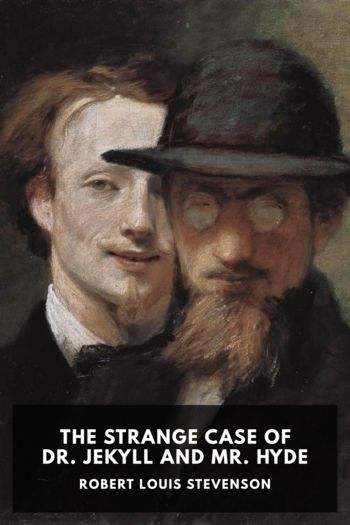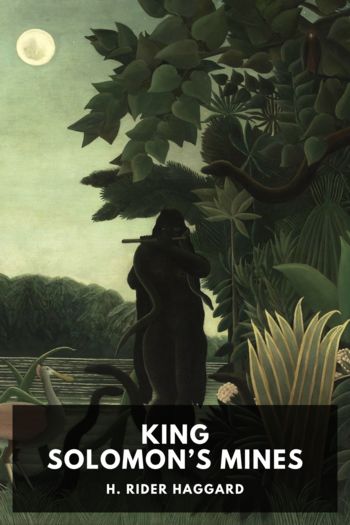Catriona - Robert Louis Stevenson (the kiss of deception read online .TXT) 📗

- Author: Robert Louis Stevenson
Book online «Catriona - Robert Louis Stevenson (the kiss of deception read online .TXT) 📗». Author Robert Louis Stevenson
We were no sooner in smooth water than the patroon, according to their beastly Hollands custom, stopped his boat and required of us our fares. Two guilders was the man’s demand, between three and four shillings English money, for each passenger. But at this Catriona began to cry out with a vast deal of agitation. She had asked of Captain Sang, she said, and the fare was but an English shilling. “Do you think I will have come on board and not ask first?” cries she. The patroon scolded back upon her in a lingo where the oaths were English and the rest right Hollands; till at last (seeing her near tears) I privately slipped in the rogue’s hand six shillings, whereupon he was obliging enough to receive from her the other shilling without more complaint. No doubt I was a good deal nettled and ashamed. I like to see folk thrifty but not with so much passion; and I daresay it would be rather coldly that I asked her, as the boat moved on again for shore, where it was that she was trysted with her father.
“He is to be inquired of at the house of one Sprott, an honest Scotch merchant,” says she; and then with the same breath, “I am wishing to thank you very much—you are a brave friend to me.”
“It will be time enough when I get you to your father,” said I, little thinking that I spoke so true. “I can tell him a fine tale of a loyal daughter.”
“O, I do not think I will be a loyal girl, at all events,” she cried, with a great deal of painfulness in the expression. “I do not think my heart is true.”
“Yet there are very few that would have made that leap, and all to obey a father’s orders,” I observed.
“I cannot have you to be thinking of me so,” she cried again. “When you had done that same, how would I stop behind? And at all events that was not all the reasons.” Whereupon, with a burning face, she told me the plain truth upon her poverty.
“Good guide us!” cried I, “what kind of daft-like proceeding is this, to let yourself be launched on the continent of Europe with an empty purse—I count it hardly decent—scant decent!” I cried.
“You forget James More, my father, is a poor gentleman,” said she. “He is a hunted exile.”
“But I think not all your friends are hunted exiles,” I exclaimed. “And was this fair to them that care for you? Was it fair to me? was it fair to Miss Grant that counselled you to go, and would be driven fair horn-mad if she could hear of it? Was it even fair to these Gregory folk that you were living with, and used you lovingly? It’s a blessing you have fallen in my hands! Suppose your father hindered by an accident, what would become of you here, and you your lee-alone in a strange place? The thought of the thing frightens me,” I said.
“I will have lied to all of them,” she replied. “I will have told them all that I had plenty. I told her too. I could not be lowering James More to them.”
I found out later on that she must have lowered him in the very dust, for the lie was originally the father’s not the daughter’s, and she thus obliged to persevere in it for the man’s reputation. But at the time I was ignorant of this, and the mere thought of her destitution and the perils in which she must have fallen, had ruffled me almost beyond reason.
“Well, well, well,” said I, “you will have to learn more sense.”
I left her mails for the moment in an inn upon the shore, where I got a direction for Sprott’s house in my new French, and we walked there—it was some little way—beholding the place with wonder as we went. Indeed, there was much for Scots folk to admire; canals and trees being intermingled with the houses; the houses, each within itself, of a brave red brick, the colour of a rose, with steps and benches of blue marble at the cheek of every door, and the whole town so clean you might have dined upon the causeway. Sprott was within, upon his ledgers, in a low parlour, very neat and clean, and set out with china and pictures and a globe of the earth in a brass frame. He was a big-chafted, ruddy, lusty man, with a crooked hard look to him; and he made us not that much civility as offer us a seat.
“Is James More Macgregor now in Helvoet, sir?” says I.
“I ken nobody by such a name,” says he, impatient-like.
“Since you are so particular,” says I, “I will amend my question, and ask you where we are to find in Helvoet one James Drummond, alias Macgregor, alias James More, late tenant in Iveronachile?”
“Sir,” says he, “he may be in Hell for what I ken, and for my part I wish he was.”
“The young lady is that gentleman’s daughter, sir,” said I, “before whom, I think you will agree with me, it is not very becoming to discuss his character.”
“I have nothing to make either with him, or her, or you!” cries he in his gross voice.
“Under your favour, Mr. Sprott,” said I, “this young lady is come from Scotland seeking him, and by whatever mistake, was given the name of your house for a direction. An error it seems to have been, but I think this places both you and me—who am but her fellow-traveller by accident—under a strong obligation to help our countrywoman.”
“Will you ding me daft?” he cries. “I tell ye I ken naething and care less either for him or his breed. I tell ye





Comments (0)